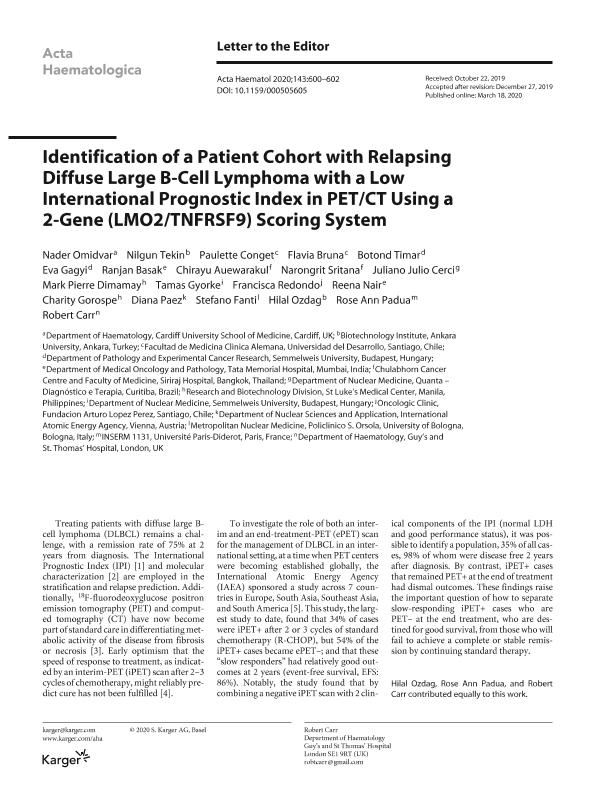Mostrar el registro sencillo del ítem
dc.contributor.author
Omidvar, Nader
dc.contributor.author
Tekin, Nilgun
dc.contributor.author
Conget, Paulette
dc.contributor.author
Bruna, Flavia Alejandra

dc.contributor.author
Timar, Botond
dc.contributor.author
Gagyi, Eva
dc.contributor.author
Basak, Ranjan
dc.contributor.author
Auewarakul, Chirayu
dc.contributor.author
Sritana, Narongrit
dc.contributor.author
Cerci, Juliano Julio
dc.contributor.author
DImamay, Mark Pierre
dc.contributor.author
Gyorke, Tamas
dc.contributor.author
Redondo, Francisca
dc.contributor.author
Nair, Reena
dc.contributor.author
Gorospe, Charity
dc.contributor.author
Paez, DIana
dc.contributor.author
Fanti, Stefano
dc.contributor.author
Ozdag, Hilal
dc.contributor.author
Padua, Rose Ann
dc.contributor.author
Carr, Robert
dc.date.available
2021-09-30T18:01:45Z
dc.date.issued
2020-12
dc.identifier.citation
Omidvar, Nader; Tekin, Nilgun; Conget, Paulette; Bruna, Flavia Alejandra; Timar, Botond; et al.; Identification of a patient cohort with relapsing diffuse large b-cell lymphoma with a low international prognostic index in pet/ct using a 2-gene (lmo2/tnfrsf9) scoring system; Karger; Acta Haematologica; 143; 6; 12-2020; 600-602
dc.identifier.issn
0001-5792
dc.identifier.uri
http://hdl.handle.net/11336/142129
dc.description.abstract
Treating patients with diffuse large Bcell lymphoma (DLBCL) remains a challenge, with a remission rate of 75% at 2 years from diagnosis. The International Prognostic Index (IPI) [1] and molecularcharacterization [2] are employed in the stratification and relapse prediction. Additionally, 18F-fluorodeoxyglucose positron emission tomography (PET) and computed tomography (CT) have now become part of standard care in differentiating metabolic activity of the disease from fibrosisor necrosis [3]. Early optimism that the speed of response to treatment, as indicated by an interim-PET (iPET) scan after 2?3 cycles of chemotherapy, might reliably predict cure has not been fulfilled [4].To investigate the role of both an interim and an end-treatment-PET (ePET) scan for the management of DLBCL in an international setting, at a time when PET centers were becoming established globally, the International Atomic Energy Agency (IAEA) sponsored a study across 7 countries in Europe, South Asia, Southeast Asia, and South America [5]. This study, the largest study to date, found that 34% of cases were iPET+ after 2 or 3 cycles of standard chemotherapy (R-CHOP), but 54% of the iPET+ cases became ePET?; and that these ?slow responders? had relatively good outcomes at 2 years (event-free survival, EFS: 86%). Notably, the study found that by combining a negative iPET scan with 2 clinical components of the IPI (normal LDH and good performance status), it was possible to identify a population, 35% of all cases, 98% of whom were disease free 2 years after diagnosis. By contrast, iPET+ cases that remained PET+ at the end of treatment had dismal outcomes. These findings raisethe important question of how to separate slow-responding iPET+ cases who are PET? at the end treatment, who are destined for good survival, from those who will fail to achieve a complete or stable remission by continuing standard therapy.
dc.format
application/pdf
dc.language.iso
eng
dc.publisher
Karger

dc.rights
info:eu-repo/semantics/openAccess
dc.rights.uri
https://creativecommons.org/licenses/by-nc-sa/2.5/ar/
dc.subject
Diffuse Large B-Cell Lymphoma
dc.subject
(LMO2/TNFRSF9)
dc.subject
Scoring System
dc.subject
Patient Cohort with Relapsing
dc.subject.classification
Bioquímica y Biología Molecular

dc.subject.classification
Medicina Básica

dc.subject.classification
CIENCIAS MÉDICAS Y DE LA SALUD

dc.title
Identification of a patient cohort with relapsing diffuse large b-cell lymphoma with a low international prognostic index in pet/ct using a 2-gene (lmo2/tnfrsf9) scoring system
dc.type
info:eu-repo/semantics/article
dc.type
info:ar-repo/semantics/artículo
dc.type
info:eu-repo/semantics/publishedVersion
dc.date.updated
2021-09-06T19:56:01Z
dc.journal.volume
143
dc.journal.number
6
dc.journal.pagination
600-602
dc.journal.pais
Suiza

dc.journal.ciudad
Basel
dc.description.fil
Fil: Omidvar, Nader. Cardiff University; Reino Unido
dc.description.fil
Fil: Tekin, Nilgun. Ankara Üniversitesi; Turquía
dc.description.fil
Fil: Conget, Paulette. Universidad del Desarrollo; Chile
dc.description.fil
Fil: Bruna, Flavia Alejandra. Universidad del Desarrollo; Chile. Consejo Nacional de Investigaciones Científicas y Técnicas. Centro Científico Tecnológico Conicet - Mendoza. Instituto de Medicina y Biología Experimental de Cuyo; Argentina
dc.description.fil
Fil: Timar, Botond. Semmelweis Egyetem; Hungría
dc.description.fil
Fil: Gagyi, Eva. Semmelweis Egyetem; Hungría
dc.description.fil
Fil: Basak, Ranjan. Tata Memorial Hospital; India
dc.description.fil
Fil: Auewarakul, Chirayu. Mahidol University; Tailandia
dc.description.fil
Fil: Sritana, Narongrit. Mahidol University; Tailandia
dc.description.fil
Fil: Cerci, Juliano Julio. Department of Nuclear Medicine, Quanta Diagnóstico e Terapia; Brasil
dc.description.fil
Fil: DImamay, Mark Pierre. St Luke's Medical Centre; Filipinas
dc.description.fil
Fil: Gyorke, Tamas. Semmelweis University; Hungría
dc.description.fil
Fil: Redondo, Francisca. Fundación Arturo López Pérez; Chile
dc.description.fil
Fil: Nair, Reena. Tata Memorial Hospital; India
dc.description.fil
Fil: Gorospe, Charity. St Luke's Medical Centre; Filipinas
dc.description.fil
Fil: Paez, DIana. International Atomic Energy Agency; Austria
dc.description.fil
Fil: Fanti, Stefano. Universidad de Bologna; Italia
dc.description.fil
Fil: Ozdag, Hilal. Ankara Üniversitesi; Turquía
dc.description.fil
Fil: Padua, Rose Ann. Université Paris Diderot - Paris 7; Francia
dc.description.fil
Fil: Carr, Robert. Guy’s and St. Thomas’ Hospital; Reino Unido
dc.journal.title
Acta Haematologica

dc.relation.alternativeid
info:eu-repo/semantics/altIdentifier/doi/http://dx.doi.org/10.1159/000505605
dc.relation.alternativeid
info:eu-repo/semantics/altIdentifier/url/https://www.karger.com/Article/FullText/505605
Archivos asociados
